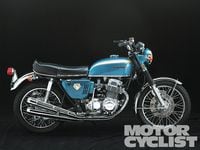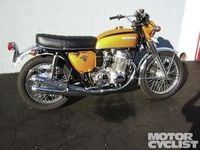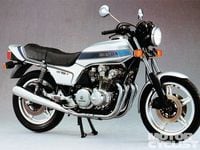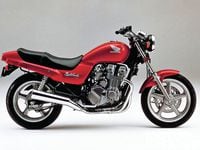1978 Honda 750 Four
Honda's CB750 Four changed the world at the 15th Tokyo Motor Show in 1968, rendering anything less effectively obsolete with 68 horsepower at 8500 rpm and a top speed around 125 mph. Purists and collectors know this pristine 1969 CB750K0 by its Candy Blue Green paint, louvered side covers, each 28mm Keihin carburetor cued by a separate throttle cable, howling 4-into-4 exhaust system and that extra flourish on the seat. Officially released in the U.S. on June 6, 1969, the K0 (say "kay-zero") was faster than all of its predecessors. Sand-cast engine cases on the first 7414 examples make original survivors as rare as they are expensive.
Subsequent models aren't quite as fast or nearly as collectable, but for anyone more interested in actual riding than escalating auction values, one of the 500,000 single-cam CB750s built between '70 and '78 is a better bet. The pipe-rack frame and swingarm are predictably flexible, suspension is primitive and it takes a serious squeeze to get that single front disc brake's attention. But dial back your expectations three or four decades and any well-preserved CB750 is a certified hoot to ride.
Aside from weeping a bit of oil around the head gasket, Honda's 736cc dry-sump inline-four ages more gracefully than other classics. It can go 100,000 miles or more between major rebuilds, given valve adjustments every 3000 miles and oil changes every 1500. Expect a bit of rattle from the clutch and other internals when cold. Once warm, evil sounds from the bottom end are bad news. Replacement parts are largely interchangeable and thus readily available for mid-'70s models. So is a beat-up, rusty exhaust. Genuine replacements—especially the howling pre-'72 4-into-4 system (Honda Model Code 300)—are insanely expensive. According to Kurt Winter at Valley Cycles in Chatsworth, California and founder of the CB750 Preservation Society (www.cb750.org), the bikes have proven recession-proof, but prices vary dramatically by zip code. Value and performance taper off after '69. The popularity of café-racer conversions has driven prices up, but bargains exist. Revive a '70s original or roll some revisionist history of your own, the CB750 is still one for the ages. MC
Cheers
Smooth, abundant power plus legendary longevity and timeless lines.
Jeers
Archaic brakes, chassis and suspension, cold-blooded in the a.m.
Watch For
Smoky exhaust, sticky front brake caliper, weak charging system, broken spokes.
Verdict
Still the modern classic after all these years.
Value
1969 | $22,000 (sand-cast cases)
1970 | $9500


1971 | $8500
Honda's best-selling CB750 and, considering improvements such as simplified throttle actuation, realistic fueling and all the juice of the original, arguably the best.

1979 | $3000
A decade after the CB750 changed history, its 16-valve DOHC successor's quantum leap in every area of performance was upstaged by Honda's six-cylinder CBX bombshell.

1991 | $1750
Intended as an affordable reassertion of basic air-cooled inline-four values, the Nighthawk is quick, comfortable, practical, affordable and decidedly dispassionate.
Source: https://www.motorcyclistonline.com/how-to/1969-1978-honda-cb750-smart-money/
